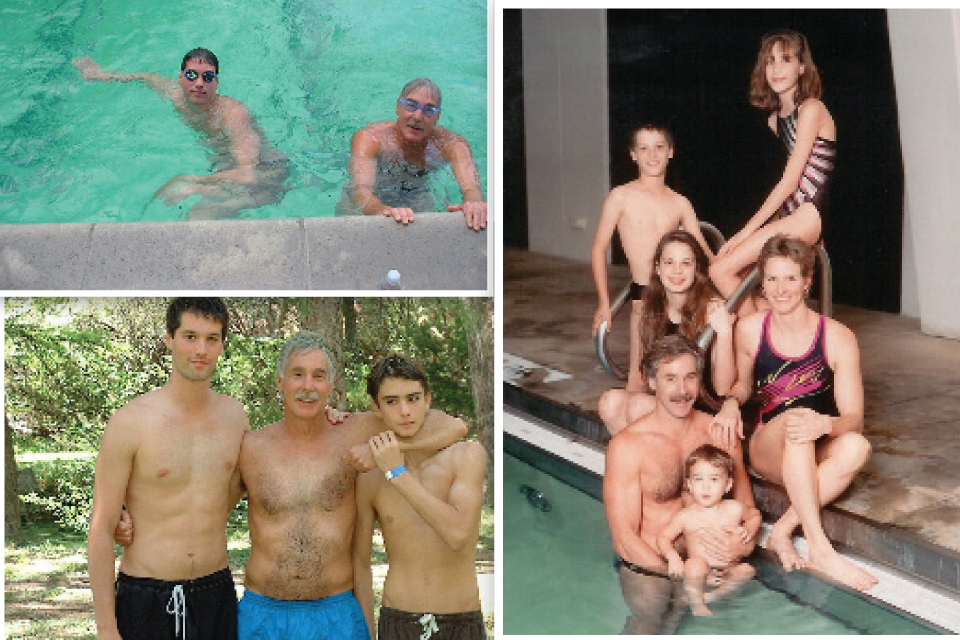Swimming: A Family Affair

Preparing for some postprandial jocundity, our family picked names out of a hat to determine teams for a game of Taboo. When my son, Bridger’s, name was picked, putting us on the same team, my daughter, Keena, screamed, “It’s not fair! Daddy and Bridger share a brain.” While Bridger and I don’t physically share a brain, we do share a passion: swimming.
It’s no surprise that our children know something about swimming. How could they not? My wife, Sandy, and I knew of each other through swimming before we were ever introduced. We met at a Masters National Championship meet, and we’ve trained together, swum on many relays together, and even competed against each other. Sandy and I have coached each other, and we’ve coached together, which we continue to do with TeamTexas Masters.
Our kids accompanied us to swimming competitions, swim practices, and swimming functions. Our children were around when I consulted with swimming teams as a sports psychologist, sitting in on many of my talks and seminars. As youngsters, Cooper and Bridger, along with Sandy, played important roles, once assisting me with a rehearsal as I prepared Canadian swimmers for the Olympics.
I’ve swum almost every day of our children’s lives. Often, they were hanging out at the pool, playing in the water, or training while I swam. I still carry wonderful images of Cooper spinning around in a tube in the same lane as the other five of us circle-swam practices.
All of our children (Kirsten, Keena, Bridger, and Cooper) swam competitively, including on teams Sandy and I coached. Keena, Bridger, and Cooper taught swimming lessons and coached with Sandy’s Westover Orcas summer league team. And Kirsten, Cooper, and Bridger competed on relay teams with us.
As a tot, Bridger enjoyed the water, yet seemed frightened. When we took him into the pool at Deep Eddy, he clung to us for dear life until one day, when he was four years old, he yelled, “Watch this!” He pushed off the wall in a near perfect streamline and swam away.
During his teen years, Bridger and I often swam in the same meets, even swimming the same event (1500-meter or 1650-yard freestyle), sometimes in the same heat. As Bridger improved, he started sneaking up on me, but he seemed to be troubled about the possibility of beating me.
One day, I took him aside and explained that I wasn’t ever going to let him beat me. I was going to fight him tooth and nail in every race and I was going to do everything I could do to beat him. But when he beat me, and he would, I was going to love it.
Oh my, did we have races. Once we swam a 1500M race in adjacent lanes. He led the entire race, with me closing the gap the last few hundred. I caught him at the last turn. Both of us sprinted to the finish with all we had. I just touched him out, knowing it might have been my last time to beat him.
We still had a few more great races, including a couple in The Money Box Cap 2K; one in which I almost caught him from pretty far behind with about 100 to go, and another where I touched him out by one hundredth of a second. But most of the time these days, he crushes me.
Bridger has been working in Atlanta the last five years, teaching math at Westminster School, where he also coaches swimming. But he still makes it back to Austin frequently. When he does, we head out to Deep Eddy, Barton Springs, or Lake Travis every day to train together. These days, I struggle to keep up with him, though I often manage to hold my own. Occasionally, I school him on a pull set. But no matter how it goes, we have so much fun. I’m in heaven swimming with him.
He almost always finds his way back to Austin to do my “Birthday Swim” with me (my age in 100s—63 of them in 2011—on a 1:30 time interval at Deep Eddy), to swim The Money Box Cap 2K, and to swim the Lake Travis Relay on a team with me.
Bridger and I talk frequently. We almost always exchange ideas about swimming. He tells me about drills he has created. We share sets we gave to our teams. We talk about what we think promotes great swimming. And among other swimming-related topics, we exchange ideas about how to help individual swimmers we coach.
It’s amazing how much passion we share for swimming, for our own, for each other’s, and for the swimmers we coach. It’s incredible, though perhaps not really surprising, how similar are our ideas about swimming. It’s almost as though we share a brain.
A former University of Texas Head Swimming Coach and United States Masters Coach of the year, Dr. Bell currently coaches TeamTexas Masters, is the President of the American Swimming Association, LLC, and is a Sports Performance Consultant. As an author, he has written ten books and more than 70 articles. As a swimmer, Dr. Bell is a four-time Collegiate All American, has 36 World and 99 Masters National Records, and has competed in two World and 67 Masters National Championships.






